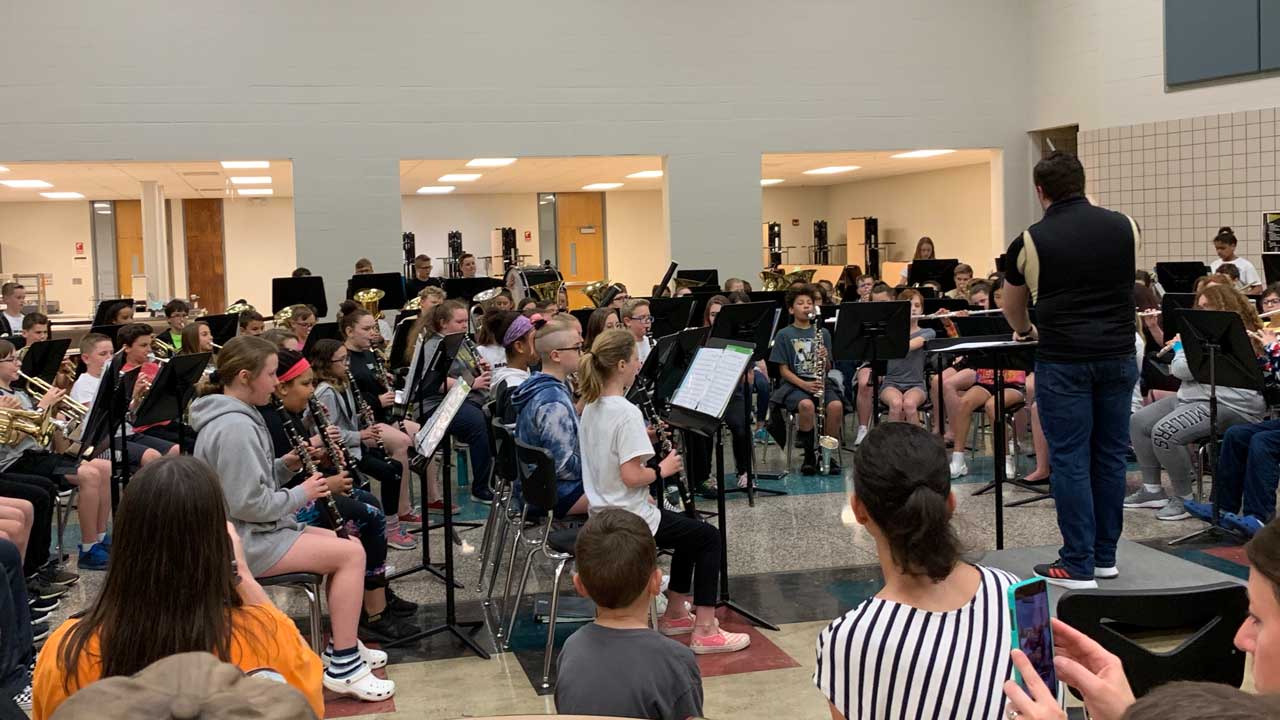
The article below is written by Mr. Alex Keim, band director, at Noblesville East Middle School. When we asked him if we could post it here, he mentioned “It is geared toward 6th grade band, but it is definitely applicable to all middle school students returning to 7th or 8th grade.” We felt like it was great advice that all middle school band and orchestra students could benefit from.
It is EXTREMELY IMPORTANT to practice your instrument over the summer so you don’t lose the playing ability and muscles that you have worked so hard to achieve this year. At the very least, you should strive to practice around 60 minutes per week (about 15-20 min every other day or 7 min a day) . If you practiced that much, you’d be in GREAT shape for 7t h Grade Band. The best thing you can do for yourself is simply PLAY, however, if you feel you need more of a “guide” to help keep your focus, here are some things you can practice:
- Complete all of the songs in the book! You can mark your progress by marking your book, or even better, using stickers to show yourself what has been completed and what hasn’t.
- **If having difficulty getting through an achievement, practice 2-3 songs before the one you’re stuck on (they will reinforce the concept you’re struggling with).**
- Buy music from J.W. Pepper (either online or in Indianapolis). You DON’T HAVE TO ALWAYS PRACTICE FROM THE BOOK! J.W. Pepper has a huge selection of more fun music (pop tunes, movies, etc) that you could use. Just tell them that you’re looking for music and that you just completed 6th Grade Band.
Have a basic plan for your practice session:
- Warm-up (5 minutes):
a. Pick from the following: Scales, or Your beginning methods book(s) from class (choose an easy song
you already know how to play without mistakes) - Something NEW (2-3 minutes)
- Songs you’ve been working on (7-8 minutes)
How to practice WARM-UPS:
- Focus on: technique (fingers, body/hand position, embouchure) and air flow/tone quality
- Practice SLOWLY (until comfortable) so you can really focus on the above while playing
How to practice something NEW:
- Scan the music first – look at the signatures (key and time), look for leaps, and look for tricky rhythms. Spend 15-20 seconds going over those spots in your head before playing.
- Sight-read the song without stopping.
- Mark problem spots in music for later practice – move on to the “practicing songs you’ve been working on”
stage
How to practice something YOU’VE BEEN WORKING ON:
- Practice SLOWLY
- Work on the measures you marked as difficult after first sight-reading
- Practice in 2-3 measure chunks around problem area
- Start to put whole song together SLOWLY
- Go back to difficult spots – start to speed them up to the proper tempo
- Practice in 2-3 measure chunks with the new tempo
- Play the whole song FASTER
- Go back and work on dynamics and articulations (accents, staccatos, tenutos, slurs, etc.)
- Play whole song with ALL components
- If having difficulty, REPEAT ANY OF THE ABOVE UNTIL YOU CAN PLAY THE SONG WITHOUT MISTAKES! This is the most important step!
*Rule of 3: play something challenging 3 TIMES IN A ROW – if you play something incorrectly, start over. DON’T STOP UNTIL YOU CAN PLAY IT 3 TIMES IN A ROW!
Tips for a successful summer:
- Practice. Practice. Practice. Just make sure to PLAY your instrument! (Percussion – practice BOTH MALLETS AND SNARE DRUM EQUALLY! You should strive to complete your goals on both, not just one!)
- Have a plan – use this to guide your practice or make your own system. Remember – you need to PLAY!
- Show your plan to your parents, and ask them to help you remember to practice.
- Remember, it takes 7 times the amount of repetition to fix a mistake. Practice SLOWLY and CORRECTLY
so you don’t have to re-do your work. - Remember #1! (Percussion – remember #1!)

Mr. Alex Keim, Noblesville East MS
